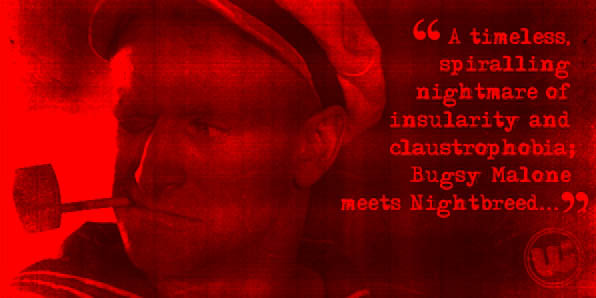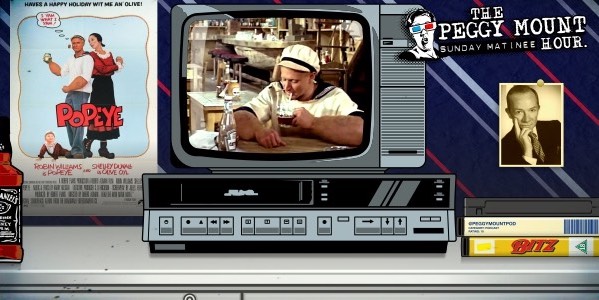
Popeye
Cert: U / 113 mins*1 / Dir. Robert Altman / Trailer
Roiling clouds conspire to occlude an azure sky, the first and last ray of hope we'll see until the house lights rise at the end of our story. Dread gathers as we skim slowly across a darkening sea, its leaden surface undulating softly under the gathering storm. A lone figure is spotted heaving against the waves in a wooden rowing boat. How he got here, we will never learn.
A low, tinny bell sounds from a wooden church silhouetted on a clifftop as the mariner is about to reach land. It is revealed that everything we have seen so far has been from this out-cropping, and we are the inhabitants of Sweethaven, a decaying fishing port worn to the bone by harsh years on the rocky coastline. We are trapped here. We belong here. We are complicit in all that is about to happen. As the sun rises wanly, villagers begin their day shambling through the near-ruins they call home with a moaning chorus almost Gregorian in its nature; stripped of deific adoration, with existential fear in its place.
Lashing the craft to a crumbling jetty, the helmsman of the rowing boat hoists himself painfully onto the boardwalk, shedding a stained, black coverall to reveal his form to the suspicious, peering crowd as it gathers. Hunched, limping and hideously deformed in a tattered mockery of naval attire, the sailor squints through his single eye at the peasants come to inspect this intrusion into their existence. Although nothing is said, one question is the only clear thing in the fetid air: has he been expected..?
This arresting scene opens Robert Altman's cinematic interpretation of Popeye, and the director is certainly best placed to handle this questing exploration of netherworld vengeance and mythological symbolism after he effortlessly entwined the horrors of warfare on and insanity with 1970's M*A*S*H (later retooled as a televisual comedy series, to poorer effect).
E.C.Segar's character of Popeye debuted in printed-form in 1929 of course, only a year after the publication of H.P. Lovecraft's The Call Of Cthulhu. Perhaps the only surprising thing about the link between Lovecraft and Segar's eldritch dyad is that it would take half a century to combine them on film.
The muttering sailor hates this village, and he is certain the feeling is mutual. The freakish townsfolk seem hell bent on their conflicting aims of refusing to let him integrate and refusing to let him leave. That they are under a spell of fear cast by their unseen patriarch is obvious, but there is something else that he cannot yet put his finger on. The fact that his time here has felt hazy, governed by dream-logic, is not helping. He remembers nothing of his life before Sweethaven. Popeye has already beaten a handful of yobs to a pulp in the tavern, only to find them there the next day as if the fracas had never occurred. Time collapses here.
Perhaps the woman is the key to all this. Shrill, vindictive and more highly strung than even the rest of the villagers - and equally as cursed with the batrachian features of the Deep Ones - Olive is nonetheless different. Popeye doubts she knows why this is, but even if she cannot provide the answers he seeks, she can probably lead him to them...
Altman's direction has aged like a fine wine as his cast shamble about the set hollow-eyed, brimming with unearthly menace. Happy to go for unsettling rather than outright terrifying, watching this in the comparative light of the 21st century assures an audience that his work here often achieves both ambient aims simultaneously. The story's timeless but resolutely vintage setting combines insularity and claustrophobia, like Bugsy Malone meets Nightbreed.
As Popeye becomes embroiled with the denizens of Sweethaven - a copyright-evading cypher for Innsmouth if ever there was one - his spiralling lack of focus becomes our own. The quest for victory becomes all even as the protagonist loses all sight of what the victory will look like. Lost in Popeye's own nightmare, Altman's work truly is the artistic culmination of Greek tragedy, Kubrickian nihilism and visceral Cronenbergian terror.
Having bested the locals, their pathetic prize fighter 'Ox Heart' and even the Commodore's personal attack-dog Bluto, the sailor finally stands in simmering silence, eye-to-eye with the reclusive puppet master himself. The broken, grizzled, mocking and resourcefully spiteful figure he sees does not surprise him. Popeye beholds a vision of himself, of what he could be if he chooses this destiny. Stripped of weakness, of doubt, of cumbersome humanity. Drowning in fire; Dagon incarnate. And then he realises there is no choice.
The gruelling journey so far - every swing, punch, duck and jab - has not been a test to destroy the mariner, but to prove his worth. He was not sent here to save Sweethaven, but to rule it. The Commodore is the sailor's father, just as The Sweet Pea is his son. They always were; they always will be. The circle is complete. Again. Popeye is home and the madness from the sea reclaims the land.
Hail to the king, baby...

(Yes, everything up there? That's a sort of sarcasm. While there is some dark potential here, Popeye is unequivocally crap.)
...and if you want to listen to some words about this film which are swearier and with The Drink involved, here's a podcast version you might be interested in:
*1 The regular, BBFC-rated version of this film is 92 minutes. There are two separate versions uploaded to YouTube which bear out this timing, and yet for the Peggy Mount Calamity Hour podcast (the precise and only reason this abomination was watched), we managed to endure the Blu-ray anniversary cut, which was somehow twenty minutes longer. For the love of god...[ BACK ]
DISCLAIMERS:
• ^^^ That's dry, British humour, and most likely sarcasm or facetiousness.
• Yen's blog contains harsh language and even harsher notions of propriety. Reader discretion is advised.
• This is a personal blog. The views and opinions expressed here represent my own thoughts (at the time of writing) and not those of the people, institutions or organisations that I may or may not be related with unless stated explicitly.


No comments:
Post a Comment